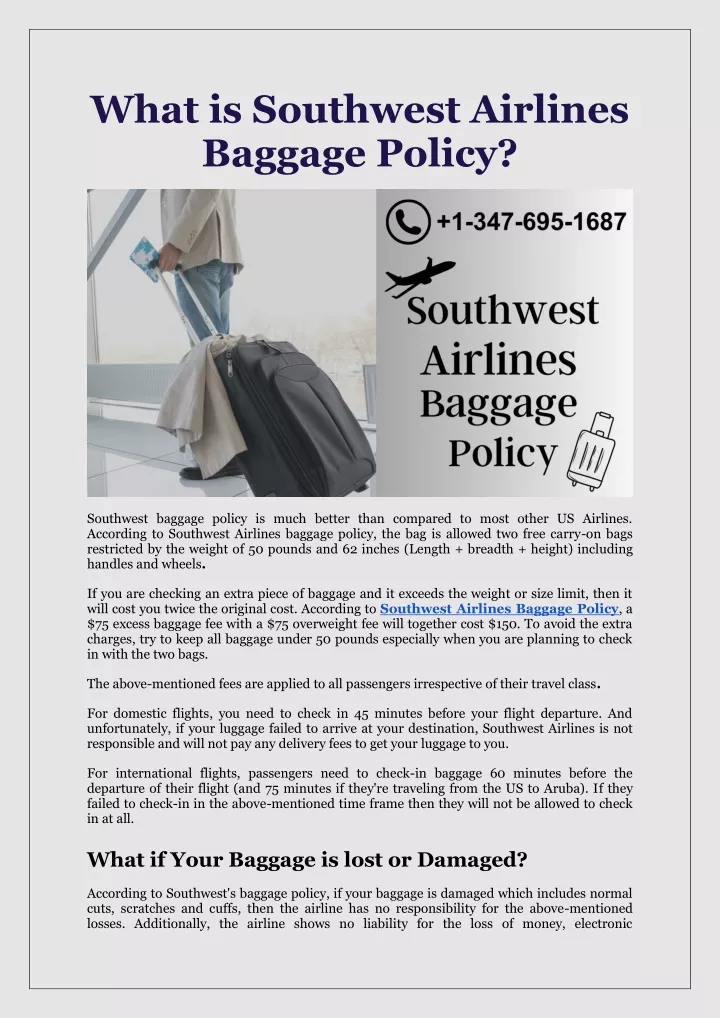Southwest Airlines' Bag Fee Changes: Impact On On-Time Performance

Table of Contents
Increased Baggage Handling Time
The introduction of baggage fees has undoubtedly led to an increase in checked bags. This seemingly minor change has significant repercussions for baggage handling time, a crucial factor influencing on-time performance.
Impact of Increased Checked Bags: The correlation between increased checked bags and extended baggage handling times is undeniable. With more bags to process, airports experience:
- Longer loading and unloading times: Planes spend more time on the ground, delaying departure and potentially impacting connecting flights.
- Potential for bottlenecks at baggage carousels: Increased congestion at baggage claim leads to passenger delays and frustration.
- Increased staff workload at baggage claim: Ground crews face greater pressure, potentially leading to errors and further delays.
While precise data comparing average baggage handling times before and after the fee changes is currently unavailable publicly, anecdotal evidence from airport staff and passenger reports suggests a notable increase. Mishandled baggage, a persistent problem in air travel, is also exacerbated by increased volume.
Carry-on Baggage Increase and Boarding Time: The new baggage fees incentivize passengers to opt for carry-on luggage to avoid extra charges. This, however, creates its own set of challenges:
- Slower boarding procedures due to overhead bin space limitations: Passengers struggle to find space for their carry-on bags, leading to delays in boarding.
- Potential for gate agents to manage increased carry-on baggage issues: Gate agents spend more time resolving disputes and managing overweight or oversized carry-on bags.
- Implications for passenger experience and overall boarding speed: The overall boarding process slows down, contributing to flight delays and creating a less efficient passenger experience.
Impact on Flight Crew Efficiency
The increased baggage handling demands have a cascading effect on flight crew efficiency.
Increased Ground Crew Workload: The additional strain on ground crews, responsible for baggage loading and unloading, is undeniable:
- Strain on resources: Ground crews might be stretched thin, impacting their ability to perform efficiently.
- Potential for burnout: Increased workload can lead to burnout and decreased morale among ground staff.
- Knock-on effects on other aspects of ground operations: Delays in baggage handling can ripple through other ground operations, leading to further delays.
Implications for Flight Crew Scheduling: Potential delays caused by increased baggage handling might necessitate adjustments in flight crew scheduling:
- Increased buffer times needed: Airlines might need to incorporate larger buffer times between flights to account for potential delays.
- Potential cost implications: Adjusting flight crew schedules comes with increased costs for the airline.
- Potential impact on crew morale: Frequent delays and schedule disruptions can negatively impact crew morale.
Data Analysis and Comparison
A comprehensive analysis requires comparing Southwest's on-time performance data pre- and post-baggage fee changes.
On-Time Performance Statistics Pre- and Post-Fee Changes: Unfortunately, readily available, publicly accessible data directly correlating Southwest's on-time performance with the specific implementation of their baggage fee changes is limited at this time. Further research and data analysis from reliable sources like the Bureau of Transportation Statistics (BTS) would be needed to establish a clear statistical correlation.
Comparing Southwest's Performance to Competitors: Comparing Southwest’s on-time performance with competitors who have different baggage fee structures would provide valuable insights. This comparative analysis could highlight whether the baggage fee policy is a significant factor in on-time performance or if other variables are more influential.
Consideration of Other Factors: It’s crucial to acknowledge other factors influencing on-time performance, such as weather, air traffic control issues, and mechanical problems. Statistical modeling could help isolate the impact of baggage fees while controlling for these other variables.
Conclusion
While definitive conclusions require further in-depth data analysis, the introduction of baggage fees at Southwest Airlines has introduced several potential factors that could negatively affect on-time performance. Increased baggage handling times, strain on ground crews, and potential delays in boarding procedures all contribute to the complexity of assessing the full impact. Further research, including a comparative analysis against competitors and a robust statistical model accounting for other influential variables, is needed to draw firm conclusions.
Have you experienced delays related to Southwest Airlines' new baggage fee structure? Share your insights in the comments below to help build a more comprehensive understanding of the impact of Southwest Airlines' bag fee changes on on-time performance. Understanding the full ramifications of these changes is crucial for both the airline and its passengers, prompting further examination of the relationship between baggage fees and on-time performance in the future.

Featured Posts
-
 Blake Shelton On Morgan Wallens Snl Controversy A Public Rebuke
May 29, 2025
Blake Shelton On Morgan Wallens Snl Controversy A Public Rebuke
May 29, 2025 -
 Alastqlal Dafe Qwy Lthqyq Altqdm Walazdhar
May 29, 2025
Alastqlal Dafe Qwy Lthqyq Altqdm Walazdhar
May 29, 2025 -
 Taylor Deardens Family Background
May 29, 2025
Taylor Deardens Family Background
May 29, 2025 -
 Oorlogsgeschiedenis En Stedelijke Verantwoordelijkheid Een Oxfam Novib Perspectief
May 29, 2025
Oorlogsgeschiedenis En Stedelijke Verantwoordelijkheid Een Oxfam Novib Perspectief
May 29, 2025 -
 Brazils Lula To Advocate For Putin Zelenskyy Meeting In Istanbul
May 29, 2025
Brazils Lula To Advocate For Putin Zelenskyy Meeting In Istanbul
May 29, 2025
